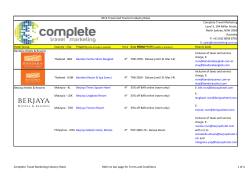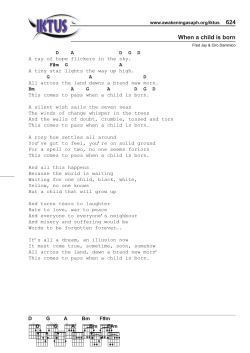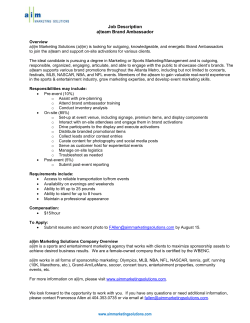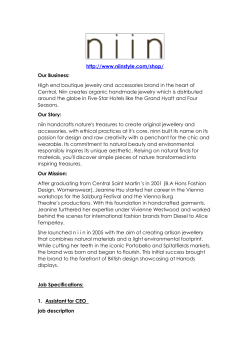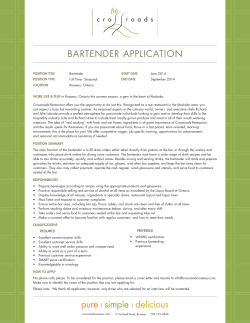
Future Business Plan
Annex 2 Future Business Plan Current Business Overview Serm Suk Public Company Limited (the “Company”) has engaged in beverage business as a manufacturer and distributor. In addition, the Company also involves in packaging business of PET bottle. The Company’s major business operations are categorized into 4 groups as follows: 1. Manufacture and distribute beverages, including Carbonated soft drinks under the brand: Pepsi, Pepsi Twist, Pepsi Max, Mirinda, SevenUp, Mountain Dew, and Club Ready-to-drink ice tea (lemon flavor), in returnable bottles under the brand: Lipton Sport drink under the brand Gatorade Tropicana Twister fruit juice (orange flavor), in returnable bottles 2. Manufacture and distribute product under the Company’s owned brand, including Drinking water under the brand: Crystal Soda water under the brand: Crystal 3. Distribute products, including Red Carabao for CarabaoTawandang Co., Ltd. Oishi ready-to-drink green tea for Oishi Trading Co., Ltd. Ready-to-drink ice tea in cans and PET bottles under the brand: Lipton for Pepsi Lipton International Ltd. Tropicana Twister fruit juice, orange flavor, in non-returnable bottles for Pepsi-Cola (Thai) Trading Ltd. 4. Manufacture and distribute packaging Manufacture and distribution of PET preform, PET bottles, and plastic closures through Petform (Thailand) Co., Ltd. Group Structure (for shareholding of 10% or more) Group Structure Serm Suk Public Company Limited % Serm Suk Holdings Co., Ltd. Shares holdings & investment management % % Petform (Thailand) Co., Ltd. Manufacture & distribution of PET pre-form, PET bottles, and plastic closures % Serm Suk Beverage Co., Ltd. Manufacture & distribution of beverages As of 31 December 2010 Page 1 The Pet Co., Ltd. Manufacture of plastic and PET bottles % Petpack Co., Ltd. Manufacture of plastic and PET bottles Financial Summary Operating Performance Sales and Earnings Before Interest, Tax, Depreciation, and Amortization (EBITDA) Unit: THB mm 19,694 19,257 18,725 16,846 14,844 1,258 1,217 1,138 992 924 9M 2009 Sales 9M 2010 EBITDA From 2007 to 2009, the Company’s sales was THB 18,725 mm, THB 19,257 mm, and THB 19,694 mm, respectively. Sales growth was 2.8% and 2.3% in 2008 and 2009, respectively. For the first nine-month periods in 2009 and 2010, the Company’s sales were THB 14,844 mm and THB 16,846 mm, respectively or equivalent to sales growth of 13.5%. Sales continues to increase driven by sales promotions and product launch in new sizes emphasizing on value, despite facing challenges from change in the consumer behavior toward other kind of beverages, including fruit juice, and competition from new players that attempt to enter the market. Gross Profit and Net Profit 6,000 26.11% 30.00% 5,000 26.11% 4,888 25.00% 4,000 20.00% 30.00% 15.00% 3,000 25.00% 10.00% 2,000 20.00% 5.00% 15.00% 1,000 0.00% 10.00% -5.00% 0 5.00% -10.00% 0.00% 4,888 26.11% 24.14% 24.14% 4,649 24.50% 4,825 24.50% 4,649 4,825 24.67% 24.67% 23.88% 23.88% 4,023 3,661 4,023 30% Unit: THB mm 25% 20% 24.14% 24.50% 3,661 24.67% 23.88% 15% 1.75% 0.72% 1.79% 1.92% 2.70% 10% 1.75% 331 331 0.72% 140 140 1.79% 354 354 1.75% 0.72% 1.79% Net profit Gross profit 287 287 1.92% 1.92% 9M 2009 Net profit margin 459 459 5% 2.70% 2.70% 9M 9M 2010 2010 0% Gross profit margin -5.00% From -10.00% 2007 to 2009, the Company’s gross profit was THB 4,888 mm, THB 4,649 mm, and THB 4,825 mm or equivalent to a gross profit margin of 26.1%, 24.1%, and 24.5%, respectively. For the first nine-month periods in 2009 and 2010, the Company’s gross profit was THB 3,661 mm and THB 4,023 mm or equivalent to a gross profit margin of 24.7% and 23.9%, respectively. Decrease in gross profit for the year 2008 was due to the higher sugar price and labor wages. However, the Company was able to maintain its gross profit margin at the level of around 24% by implementing cost management of packaging materials. Page 2 From 2007 to 2009, the Company’s net profit was THB 331 mm, THB 140 mm, and THB 354 mm, or equivalent to a net profit margin of 1.8%, 0.7%, and 1.8%, respectively. For the first nine-month periods in 2009 and 2010, the Company’s net profit was THB 287 mm and THB 459 mm or equivalent to a net profit margin of 1.9% and 2.7%, respectively. In 2008, the net profit margin decreased sharply due to the higher cost of goods sold mentioned earlier; including the significant increase in oil price. In 2009, net profit margin improved due to the decrease in the oil price. Moreover, the Company improved its logistic system to be more efficient, and the Company further promotes products with high profitability into the market. Return of Assets (ROA) and Return on Shareholders’ Equity (ROE) 5.5% 5.2% 4.7% 3.5% 3.6% 2.2% 3.5% 1.5% 9M 2010* ROA ROE * Forecast full year revenue 2010. The decreasing figures are due to the increase in assets and shareholders’ equity of approx.THB 3,600 mm as a result of new appraisal value of land in Q3 2010 From 2007 to 2009, ROA was 3.5%, 1.5% and 3.6%, respectively. For the first nine-month periods in 2010, ROA was 3.5%. From 2007 to 2009, ROE was 5.2%, 2.2%, and 5.5%, respectively. For the first nine-month periods in 2010, the ROE was 4.7%. Financial Status Assets, Liabilities and Equity Unit: THB mm 13,240 9,435 6,316 3,119 9,989 9,766 9,224 6,388 6,227 3,378 2,996 3,251 9M 2010 Assets Laibilities Page 3 Equity At the end of 2007 to 2009, the Company has total assets of THB 9,435 mm, THB 9,224 mm, and THB 9,766 mm, respectively, which is equivalent to a growth rate of -2.2% and 5.9% in 2008 and 2009, respectively. At the end of the third quarter of 2010, the Company has total assets of THB 13,240 mm. The considerable increase in the total assets was due to the change in accounting policy on item “Land” from using cost method to new appraisal value revaluated by independent appraiser. Consequently, the change caused the value of land in the consolidated financial statement to increase by THB 3,624 mm. At the end of 2007 to 2009, the Company has total liabilities of THB 3,119 mm, THB 2,996 mm and THB 3,378 mm, respectively, or equivalent to a growth rate of -3.9% and 12.7% in 2008 and 2009 respectively. At the end of the third quarter of 2010, the Company has total liabilities of THB 3,251 mm. In 2007 to 2009, accounts payable accounted for the major portion of the Company’s liabilities, which equivalent to approximately 31% to 35% of the total liabilities. Currently, the Company does not have any loan from financial institutions. At the end of 2007 to 2009, the Company has total shareholders’ equity of THB 6,316 mm, THB 6,227 mm, and THB 6,388 mm, respectively, or equivalent to a growth rates are -1.4% and 2.6% in 2008 and 2009 respectively. At the end of the third quarter of 2010, the Company has total shareholders’ equity of THB 9,989 mm. The significant increase in the total shareholders’ equity was due to the change in the land valuation method as mentioned earlier. Surplus on the land revaluation was book in the shareholders’ equity. Company’s Core Strength 1. Products manufactured and distributed by the Company are well-established brand, which are: Products manufactured and distributed by the Company: Carbonated soft drinks under the Pepsi brand, which rank number one in market share in the cola soft drinks market in Thailand, one of the few bottlers in the world that achieve larger market share than “Coke” Products under the Company’s owned brand: The Company has launched the drinking water product under the Crystal brand since 1993, which Crystal drinking water was highly successful because of its product quality, efficient distribution channels, well customer service and effective marketing activations. Sales revenue of Crystal drinking water has grown at the average of approximately 17.5% per annum (CAGR) from 2006 to 2010. However, the Company has limitation in creating its owned brand product due to the condition of the current Exclusive Bottling Appointment with Pepsi Co Inc. and SevenUp (“Pepsi”) (“EBA between the Company and Pepsi”) Products distributed by the Company: The Company has been the distributor of Red Carabao and Oishi ready-to-drink green tea since 2002 and 2005, respectively. Sales of Red Carabao and Oishi ready-to-drink green tea grew at the average of 13.4% and 22.3% per annum (CAGR) from 2006 to 2010 Page 4 2. Well-located manufacturing bases with sufficient capacity Factories Nakornsawan State of the art manufacturing and packing factories with total production capacity of 199.1 mm raw case per year Flexibilities in the production line in adjusting production for each product size High yield and low waste Each factory locates in important regions to serve all catch areas across the country Nakornratchasrima Pathumthani Chonburi Suratthani 3. Efficient distribution network Warehouses North East 13 warehouses North 12 warehouses 3 sub-warehouses Transportation Huge fleets and river barges to deliver products from factories, located in all regions, to distribution centers Distribution Centers South 4 warehouses 2 sub-warehouses Bangkok/Central 18 warehouses 4 sub-warehouses 47 warehouses and 9 subwarehouses dispersed across all regions Distribution of products through all channels in traditional trade and modern trade Delivery of Product to Customers Page 5 1,400 route sales to cover distribution channels nationwide Approximately 300,000 outlets such as wholesalers, retailers, convenience stores, restaurant, quick serve food outlets, and entertainment complex throughout the country 4. Experienced and Proficient Management Team Corporate Structure Mr. Somchai Bulsook President and CEO Operation • Mr. Dhitivute Bulsook Director and General Plant Manager (Pathumthani) Working experience with SSC 17 years Technical Engineering • Mr. Somnuek Suvanich Technical Director Working experience with SSC 13 years Sales and Marketing Support • Mr. Parinya Permpanich Marketing and Sales Operation Director • Mrs. Darunee Yindeepholcharoen Acting Finance Director Working experience with SSC 31 years Working experience with SSC 4 years • Mr. Arthakrit Visudtibhan Human Resource Director • Mr. Sin Kusri General Plant Manager (Nakornsawan) Working experience with SSC 8years Working experience with SSC 39 years • Mr. Kwanchai Mahapornprachak General Plant Manager (Nakornratchasrima) Working experience with SSC 3 years Future Business Plan Future business plan comprises 2 parts:- Business Operating Plan and Proceedings in Relation to the Agreements Between the Company and Pepsi: I. Business Operating Plan 1. Expansion on Non-Carbonated Soft Drinks (“Non CSD”) The Company’s historical track record has proved that the Company is capable of offering products with high-quality standard, providing good service, and responsive to customer demands. Moreover, the Company is also capable to maximize the growth opportunity of products / brand that meet customers demand through its efficient distribution network and expanded customer base. Due to the change in consumer behavior that moves toward more health concern, the noncarbonate soft drinks including, fruit juice, functional drinks, and etc., has shown increasing popularity from the consumers. The Company acknowledges this opportunity and has a policy to focus on potential and fast growing categories such as fruit juice, coffee, functional drinks, and etc. The expansion of market in non-carbonated soft drinks can be done by launching new products to the market under the Company’s owned brand or the Company may acquire existing successful products or brands in the market. The Company believes that these policies will generate growth in sales for the Company in the future. 2. Expansion in Drinking Water Market Under the Brand Crystal The Company has introduced Crystal drinking water since 1993, the first drinking water brand in Thailand that has been certified by NSF, an international audit agency that inspects and certifies quality standards of bottled drinking waters. Demand for Crystal drinking water increased sharply in recent years accompanied by success factors of Crystal drinking water, such as its product Page 6 quality, efficient distribution channels, well customer service and effective marketing activations, these attributes contribute to sales revenue to show average growth of approximately 17.5% per annum (CAGR) from 2006 to 2010. Due to the continual growth in sales revenue of Crystal drinking water, the Company plans to invest in additional drinking water line to ensure sufficient capacity to capture the higher growth opportunity. 3. Distributor of Food and Beverage Products By having an efficient distribution network, with 47 warehouses and 9 sub-warehouses in every region and 1,400 route sales to cover wholesalers, retailers, convenience stores, restaurant, quick serve food outlets, and entertainment complex throughout the country and as the distributor of Red Carabao and Oishi ready-to-drink green tea that shown average growth in sales revenue of approximately 13.4% and 22.3% per annum, respectively, this have proven the Company’s distribution efficiency in delivering product to customers which have been widely recognized by the market. The Company plans to expand its product distribution beyond beverages to other type of products, such as snack, food, and etc., through the current efficient distribution network. 4. Manufacturer of other Carbonated Soft Drinks products The production and distribution of carbonated soft drinks is a large industry requiring modern machinery for production, quality control, and efficient logistic for delivery of products to customers nationwide. The Company has been in the carbonated soft drink industry for more than 50 years and equipped with modern manufacturing and bottling facility, good quality control, and efficient distribution channel, which are the keys to success in carbonated soft drinks business. With the Company’s experience and keys success factors, the Company proved to be the leader in the cola soft drinks market, which is one of the few countries to obtain larger market share than “Coke”. The Company believes in its capability to manufactures and distributes carbonated soft drinks under other brands that will further generate growth to the Company in the future. However, the ability to manufacture and distribute carbonated soft drinks under other brands is subject to the negotiation of the change in Exclusive Bottling Appointment (EBA) and Cooperative Advertising & Marketing Agreementbetween the Company and Pepsi Group. II. Proceedings in Relation to the Agreements Between the Company and Pepsi The Special Board of Directors’ Meeting No. 2/2011 on Thursday, January 20, 2011 the Board of Directors deemed it appropriate to propose that the Meeting of Shareholders refuses to accept the proposals from Pepsi, which resulted from the negotiation to amend commercial terms and contractual terms of the Agreements between the Company and Pepsi, proposed on January 12, 2011 (“Pepsi’s Proposals”). The Company has not received any additional proposal from Pepsi after the Working Committee delivered their comments to Pepsi’s proposals. (The Company reported the summary of essence of Pepsi’s proposal through the electronic source of the Stock Exchange of Thailand (ELCID) on January 21, 2011.) The Future Business Plan which includes proceeding with matters in relation to the Agreements between the Company and Pepsi are as follows: Page 7 1) Enter into a new agreement with Pepsi in the form and substances that are reasonably acceptable to the parties, the essence of which shall be as follows: a) It shall contain the formula for calculating the price of the concentrates, which results in the price of the concentrates to drop 9% per year from the price under the present EBA; b) If Pepsi insists on preserving the right to terminate the agreement upon change of control in the Company, there shall not be provisions regarding penalty or damages to be incurred by the Company and the term “Control” shall have a definition which is clear and generally acceptable; c) The Company shall not be subject to restriction on the production and sale of the beverages under the Agreements with Pepsi, unless the beverages are of the same kind and type and are in competition with each other, such as Cola; d) With respect to other proposed Commercial Terms in relation to sale promotion and marketing budget, Contractual Terms and Pepsi’s Requests, unless otherwise prescribed under a) - c) or e) herein, shall be in accordance with Pepsi’s Proposals; and e) Other provisions and conditions must be reasonable, such as the period of a notice to terminate the agreement, and the agreement shall not have provisions or conditions which are not direct commercial points for the agreements of such nature, such as provision on the right of Pepsi to appoint an executive, or provisions which are beyond the control of the Company. Further the Company must receive confirmation from Pepsi that it accepts to enter into agreements that contain the aforementioned essences within 15 days from the date the Meeting of Shareholders passes the resolution. The new agreements must be entered into by March 31, 2011; and 2) In the event that the Company does not receive confirmation from Pepsi that it agrees to the provisions in clause 1) above within 15 days from the date the Meeting of Shareholders passes the resolution, the Company shall terminate the Agreements between the Company and Pepsi immediately. The termination shall be effective as the Board of Directors considers appropriate but no later than 12 months from the date of such termination letter. The Board of Directors of the Company or person, whom the Board of Directors designated, is authorized, to proceed with the serving the termination letter and with other appropriate actions in relation to the termination of the said agreements. Page 8
© Copyright 2025


